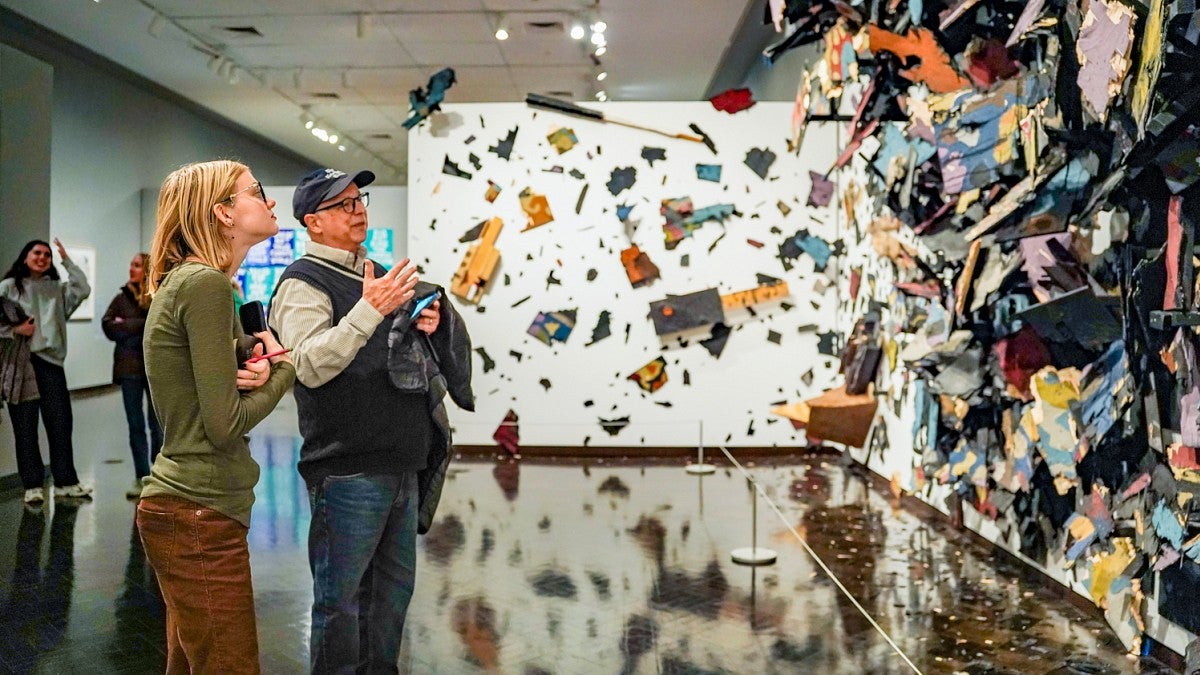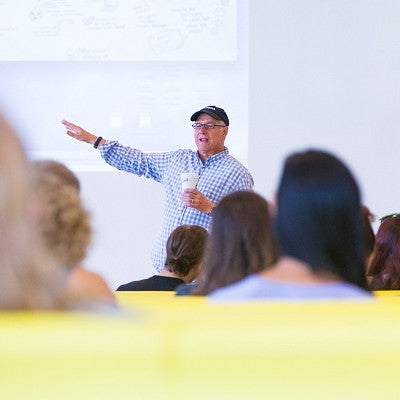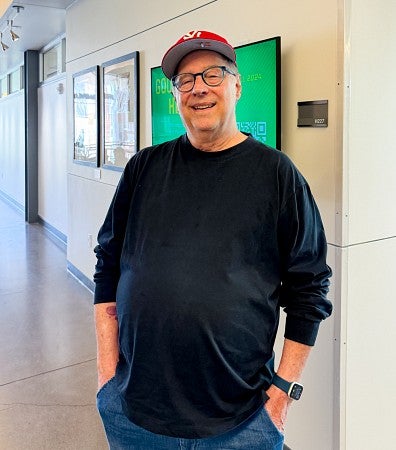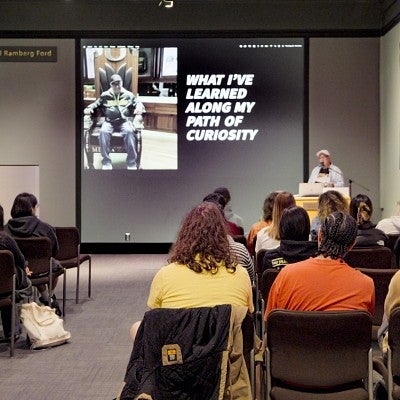The popular class teaches students how to develop curiosity.

Contrary to the name, Curiosity for Strategists is not just for strategists. It’s for life.
Launched in 2006 at the UO School of Journalism and Communication (SOJC), the popular advertising class was the brainchild of Professor of Practice David Koranda, who came up with the idea of teaching curiosity after realizing many students were consuming mostly time-wasting entertainment online rather than books.
“But the part that was really missing was not discussing any of that in depth with each other in person, but just liking or writing a quick comment or posting an emoji and moving on,” Koranda said. “I wanted to help them deepen their curiosity and share it.”
The class has since been replicated at universities around the nation and is popular among students at the SOJC. Koranda taught it for the last time last spring before retiring, but it will continue in the fall with Alex Segré Cohen, who also serves as an assistant professor of science and risk communication.

Reflecting on the class he taught for nearly two decades, Koranda said the topic remains important because in a world lived digitally with constant information at our fingertips, we have surprisingly become less curious.
After he began teaching the class, he discovered another alarming phenomenon: Schools were squelching the curiosity of students.
“Almost every class I've had since 2006, students have said that they were very curious as children, and somebody said, ‘Stop asking so many questions,’” Koranda said. “The reality is, those people should have said, ‘You should keep asking more questions.’”
Koranda dove deep into the education system and realized that schools have encouraged this lack of curiosity by telling us exactly what to do, and that is to “memorize, regurgitate and forget,” Koranda said. As a result, children in the United States often grow up knowing only what they’ve been told.
“If we haven’t developed a sense of curiosity that goes beyond memorizing, then we won’t function as well as we could, and we have a fear about our own success,” Koranda said.
Living a life of adventure and curiosity
Koranda has constantly lived between the pages, navigating childhood by running around the streets of New York City, sailing down the Long Island Sound on a homemade raft, living a short stint as an artist in a lofty warehouse in Pier 41 in San Francisco, sailing up the East Coast with an old Panamanian guy, then raising 14 horses with his daughter.
Throughout all of this, he studied business, then architecture, then finally found a home in the perfectly unconventional world of advertising.

Throughout this existence, driven by asking questions and being completely open to every opportunity, he discovered the secret to success. In short, success is not about doing what everyone else does. It’s about finding the corners that people don’t notice, figuring out what people don’t do now and what truly drives your authentic self, and then running with it.
And all of this is driven by curiosity.
Developing a thirst for knowledge
This is where his mission began, to help students discover what he calls epistemic curiosity: “Where you want to keep learning in a deeper sense,” Koranda said. “The thirst for knowledge.”
In a world of instant gratification manifested through online shopping and Instagram likes, curiosity forces presence, he says. In a loneliness pandemic that worsened with Covid-19 lockdowns and has yet to rebound, curiosity can inspire empathy. In a society stuffed with the need to produce, constantly looking to external sources for approval and validation, curiosity helps us look within.
Bonnie Wan is the Head of Brand Strategy at Goodby and the author of “The Life Brief: A Playbook to No-Regrets Living,” a book applying strategic principles to life’s problems, to understand with crystal clarity what readers really want. She’s also Koranda’s close friend. He recently assigned his Advertising and Brand Responsibility Master’s Curiosity class to read the book and write their own life briefs to inspire introspection.
“We need to drop into those deeper places of ourselves that initiate discovery, initiate growth, initiate connection, and curiosity is at the root of all of those deeper, richer parts of life,” Wan said.
The search for authenticity
Curiosity for Strategists jumpstarts this journey by helping students build a toolbox full of ways to slow down, open our eyes and surface the questions that will let us see the same surroundings differently. It gives students the power to face the world with the knowledge that the person who is showing up is completely genuine, inside and out.
Each week, students take on exercises to help them shift out of their habits. This could mean taking a different path on the way home, eavesdropping on people’s conversations, taking a walk through the art museum or reading a magazine they would never think of picking up.

In class, the focus is on strategy. From interviewing students on campus using unconventional questions to solve problems in unconventional ways, to creating a movie or product idea based on three random items, students learn that amazing things can come out of thinking from a different perspective.
“Curiosity taught me to slow down and look at the little things in life,” said Avery Csaszar, a student in Koranda’s last Curiosity class. “I learned creativity can be found all around us and in all things if we allow ourselves to discover it.”
Koranda strives to show students there is more to their journey than what they’ve been told. Life is not linear, and it shouldn’t be. It should be a series of ups and downs, setbacks and side quests.
Strategists often talk about the importance of a thread running through each campaign, or the core idea. It is similar with life. If there is a thread running through every path that is taken, you will always make your way toward something beautiful, Koranda said.
“You've got to be able to go off track, but understand what the thread is underneath it,” Koranda said. “If you're really aware of your life and what you want and your mission, then it's all going to be successful.”
It is our job to use life
Curiosity for Strategists is a class for aspiring strategists, but Koranda created the class to ignite in advertising students the desire to be curious, because thinking differently is at the core of the ad industry. However, the concept of curiosity is not just for advertising students. It’s a technique, a skill to live an authentic existence.
Curiosity is the key to every door, Koranda says, and it’s our choice to decide if we will use it.
“There is a Japanese phrase called shi-me. It is the word for ‘mission’ but literally translates to ‘use life,’” he said. “In other words, how we use our life is our mission. It's not something in the future, not something that anyone gives to us. It's how we literally use our life every moment.”
—By Kaia Mikulka, class of '25
Kaia Mikulka is an advertising major, a member of the School of Journalism and Communication direct-admit program, and a business minor. She comes from an artist’s background, and her passions lie in combining art with marketing to foster a better world.
